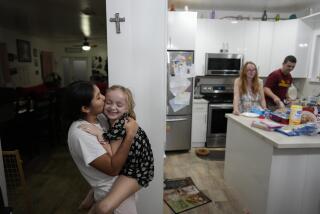More grandparents serving as primary caregivers to children
- Share via
As American parents have grappled with financial peril and other woes over the last decade, grandparents have stepped in to help. Grandparents were the main caregivers for more than 3 million children in 2011 — a 20% increase from the turn of the millennium, the Pew Research Center reported Wednesday.
The numbers surged during the economic downturn and have leveled off in its aftermath, Pew said in a report based on an analysis of U.S. Census Bureau data. Sixty percent of those children still have at least one parent at home, but grandparents are responsible for most of their needs.
Experts believe parents are leaning on their elders as financial problems linger past the recession.
“The parent gets laid off, or their home is foreclosed upon. They can’t afford the mortgage or rent,” said Susan Smith of the nonprofit Insight Center for Community Economic Development. Often “the quickest solution is, ‘Mom, Dad, can you help out?’ ” With the “jobless recovery,” Smith said, that help is still needed.
But money is just one of many problems that push grandparents into caregiving. Nearly half of parents who lived with their kids but left grandparents in charge were teens when their babies were born, Pew found. Other parents handed off children to grandparents when they went to serve in Iraq or Afghanistan, said Amy Goyer, home and family expert for AARP. Still others lost or relinquished their kids after tangling with drugs or alcoholism, suffering mental illness or landing in prison.
Outside of Hemet, Peggy and Jamie Helminiak became guardians to their granddaughter after her mother slid back into using drugs. The child and her mother first began living with them after their home fell into foreclosure, but it wasn’t until the addiction reemerged that the Helminiaks took on the job of parenting.
“We went from being fun Grandma and Grandpa to having to do the discipline,” Peggy Helminiak said.
In South Los Angeles, Debra Lee reared two grandchildren and is now raising another child — the 5-year-old daughter of her granddaughter — because the teenage mother suffered from mental illness, lashing out and screaming at teachers and disappearing from home for days at a time. Lee said that if she hadn’t taken in the youngster as a foster parent, the girl would have gone to someone else.
More than a fifth of grandparents who care for grandchildren live under the poverty line, Pew found — more than twice the overall poverty rate among Americans ages 50 and over. The financial challenges appear especially stark for grandparents raising grandchildren alone: In California, nearly half of custodial grandparents ages 65 and over did not make enough money to cover the basics for themselves and their grandchildren, a recent UCLA study found. Federal and state aid is sometimes out of reach, the report said.
“You may have set aside a retirement for you and your husband — and now you have to spend your savings on feeding and clothing young children,” said Sylvie de Toledo, founder of the nonprofit Grandparents As Parents and author of a survival guide with the same name.
In Reseda, Jacklyn Laird had one bedroom and four young kids to put to bed when she first brought her grandchildren home over a decade ago, keeping them from foster care after their father was arrested, she said. Two took over her bedroom, two bedded down in what once was her “craft room,” and Laird ended up sleeping on the couch.
Taking in the kids meant she couldn’t pay off the house or spend days “puttering in the garden,” Laird said. It also cut off a romantic relationship that had lasted three years.
But when Laird stood on her chair to cheer for one of her grandsons at his sixth-grade graduation, she remembers hearing another boy holler, “Your Nana is awesome!” — the same boy who once told her grandson his “mom” was old.
“I will never forget that,” she says tearfully.
Like many of the grandparents De Toledo helps, Laird became a caregiver long before the recession. However, De Toledo said problems that often force parents to hand over their children — such as drug addiction or alcoholism — might have worsened as families suffered financial stress.
Beyond the recession, the growing numbers might also be tied to the aging of the vast generation of baby boomers, Pew senior researcher Gretchen Livingston said.
“Many are still pretty young grandparents — and they’re able to be actively involved,” Livingston said.
More to Read
Sign up for Essential California
The most important California stories and recommendations in your inbox every morning.
You may occasionally receive promotional content from the Los Angeles Times.








